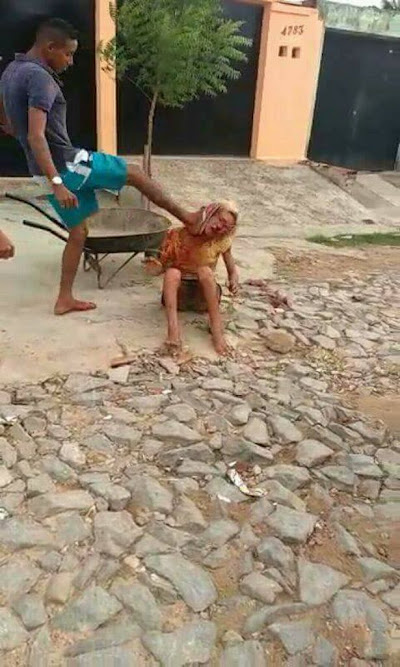This isn't war. It's the destruction of the Russian people by their own
In war of the machines there is no heroic death on blooming meadows. This russian tanksoldier made it out of the debris of his destroyed tank but then died of his injuries
They never had a chance.
Fumbling blindly through cratered farms, the troops from Russia’s 155th Naval Infantry Brigade had no maps, medical kits or working walkie-talkies, they said. Just a few weeks earlier, they had been factory workers and truck drivers, watching an endless showcase of supposed Russian military victories at home on state television before being drafted in September. One medic was a former barista who had never had any medical training.
Now, they were piled onto the tops of overcrowded armored vehicles, lumbering through fallow autumn fields with Kalashnikov rifles from a half-century ago and virtually nothing to eat, they said. Russia had been at war most of the year, yet its army seemed less prepared than ever. In interviews, members of the brigade said some of them had barely fired a gun before and described having almost no bullets anyway, let alone air cover or artillery. But it didn’t frighten them too much, they said. They would never see combat, their commanders had promised.
Only when the shells began crashing around them, ripping their comrades to pieces, did they realize how badly they had been duped.
Flung to the ground, a drafted Russian soldier named Mikhail recalled opening his eyes to a shock: the shredded bodies of his comrades littering the field. Shrapnel had sliced open his belly, too. Desperate to escape, he said, he crawled to a thicket of trees and tried to dig a ditch with his hands.
Of the 60 members of his platoon near the eastern Ukrainian town of Pavlivka that day in late October, about 40 were killed, said Mikhail, speaking by phone from a military hospital outside Moscow. Only eight, he said, escaped serious injury.
“This isn’t war,” Mikhail said, struggling to speak through heavy, liquid breaths. “It’s the destruction of the Russian people by their own commanders.”
Russian President Vladimir Putin’s war was never supposed to be like this. When the head of the CIA traveled to Moscow last year to warn against invading Ukraine, he found a supremely confident Kremlin, with Putin’s national security adviser boasting that Russia’s cutting-edge armed forces were strong enough to stand up even to the Americans.
Russian invasion plans, obtained by The New York Times, show that the military expected to sprint hundreds of miles across Ukraine and triumph within days. Officers were told to pack their dress uniforms and medals in anticipation of military parades in the Ukrainian capital, Kyiv.
But instead of that resounding victory, with tens of thousands of his troops killed and parts of his army in shambles after nearly 10 months of war, Putin faces something else entirely: his nation’s greatest human and strategic calamity since the collapse of the Soviet Union.
How could one of the world’s most powerful militaries, led by a celebrated tactician like Putin, have faltered so badly against its much smaller, weaker rival? To piece together the answer, we drew from hundreds of Russian government emails, documents, invasion plans, military ledgers and propaganda directives. We listened to Russian phone calls from the battlefield and spoke with dozens of soldiers, senior officials and Putin confidants who have known him for decades.
The Times investigation found a stunning cascade of mistakes that started with Putin – profoundly isolated in the pandemic, obsessed with his legacy, convinced of his own brilliance – and continued long after drafted soldiers like Mikhail were sent to the slaughter.
At every turn, the failures ran deeper than previously known:
– In interviews, Putin associates said he spiraled into self-aggrandizement and anti-Western zeal, leading him to make the fateful decision to invade Ukraine in near total isolation, without consulting experts who saw the war as pure folly. Aides and hangers-on fueled his many grudges and suspicions, a feedback loop that one former confidant likened to the radicalizing effect of a social-media algorithm. Even some of the president’s closest advisers were left in the dark until the tanks began to move. As another longtime confidant put it, “Putin decided that his own thinking would be enough.”
Undiluted Relationship and information bring you undiluted serial killer story, serial killers facts, murder, true crime, true crimecommunity, horror, truecrime addict, crime , tedbundy , homicide ,halloween, killer, rodneyalcala, murder on my mind, ,history ,netflixandchill ,deadlymen ,crimewatchdaily ,murderisthenewblack ,historic ,fearthyneighbor ,netflixandcrime ,crime memes ,dark ,murderer ,horrormovies ,insane ,history and many. Feel free to share and comment. Bringing you the best. Undiluted Relationship and Information





Comments
Post a Comment